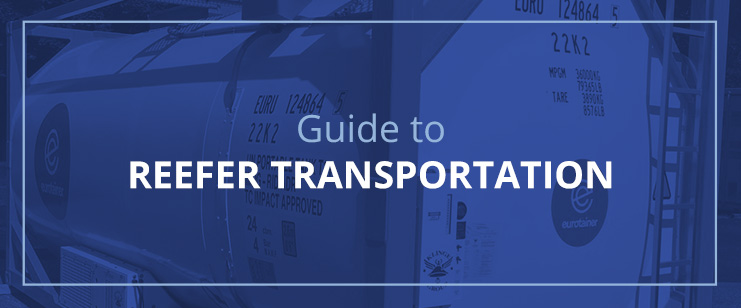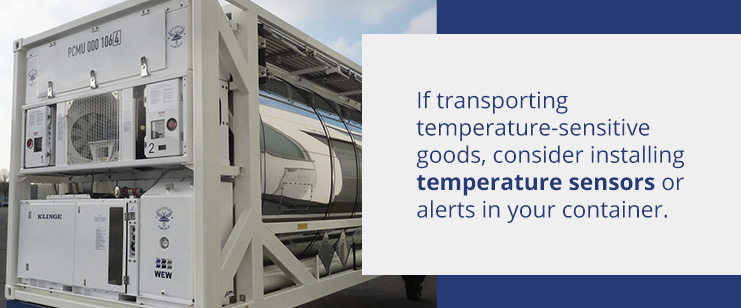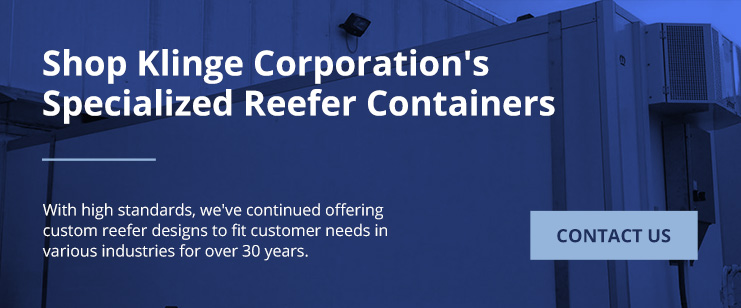
Reefers are refrigerated containers for storing or transporting temperature-sensitive goods. These refrigerated containers are kept at specific temperatures to prevent products like fruit, meat and pharmaceuticals from spoiling during shipment. Reefer containers make it possible to share refrigerated and frozen goods across states, countries and oceans.
In this guide, we’ll take a closer look at reefer container repairs, maintenance and inspection, as well as what to look for in a reefer shipment and manufacturing company.
Table of Contents
- Inspect Your Reefer Before Shipping
- Reefer Container Temperature Monitoring
- Proper Reefer Container Maintenance
- Use Reliable Reefer Container Shipping Companies
- Find a Trusted Reefer Manufacturer
- Shop Klinge Corporation’s Specialized Reefer Containers
Inspect Your Reefer Before Shipping
Pre-shipment inspection is crucial to ensuring a reefer is in optimal condition for transporting contents. Some freight companies require an inspection before shipment because a reefer’s contents can be easily spoiled if part of the unit is damaged. For example, if a door doesn’t latch properly, wiring is frayed or other parts are damaged or missing, there’s a risk of the refrigerated contents spoiling during transport, resulting in a significant loss of money and products.
Additionally, reefers and similar units are often tampered with to sneak illegal substances and products into other countries. When inspecting your reefer, be thorough and check everything. Know these seven points for inspection:
- Unit exterior: Inspect open areas and ensure all panels on the outside seal properly and are secure.
- Undercarriage: Check the undercarriage of the reefer to ensure there is no damage.
- Doors and locks: Ensure all doors have reliable locking mechanisms and secure plates to prevent seal tampering. Inspect that bolts are tight. If the inside of the doors has excessive damage, like denting, consider having it repaired prior to shipment to ensure proper refrigeration.
- Unit sides: While inspecting the inside walls, look for any damage, like holes or rust, and any signs of tampering.
- Unit interior: Ensure all screws and rivets in the interior refrigeration panels are intact and free of excessive damage.
- Ceiling and roof: Visually confirm the ceiling isn’t sagging or dipping and look for properly secured screws and rivets.
- Flooring: Check that the unit floor is stable and damage is adequately repaired. Inspect all aspects of your container using this reefer container inspection checklist to ensure proper functions and secure transport.
Inspect all aspects of your container using this reefer container inspection checklist to ensure proper functions and secure transport.
Reefer Container Temperature Monitoring
Because the products and goods are temperature-sensitive, keeping the reefer within the optimal temperature range is essential to maintain temperature and avoid spoilage. Traditionally, while the reefers are on freight ships, technicians take temperature readings every few hours.
This is not ideal because walking around in between containers while at sea puts technicians in unsafe situations. It also makes it difficult to ensure consistent reefer temperatures. If there’s something wrong with your reefer, it may be hours until a technician gets around to it.
While some goods may withstand larger temperature ranges, other cargo is especially temperature-sensitive. In these cases, reefer temperature tracking is crucial. If transporting temperature-sensitive goods, consider installing temperature sensors or alerts in your container or choose a reefer manufactured with alarms and independent thermostat controls. When the reefer’s internal temperature goes outside your specified range, the alarms alert you so the problem can be resolved sooner rather than later.

Proper Reefer Container Maintenance
In addition to regular inspections, proper maintenance keeps your reefer container in good condition and extends its usable life. Corrosion and other factors can quickly shorten the life span of your reefer, especially if it’s exposed to salt air. To keep your reefer in the best possible condition, consider the following maintenance tips.
Defrost Your Reefer
Defrosting your reefer every so often can help improve its performance. Ice can build up when moisture thaws and refreezes in the unit, blocking circulation and creating a flawed cooling environment. Defrost your reefer when you conduct other maintenance to allow all the built-up ice to melt and be cleaned from the container.
Wash Your Reefer Regularly
Cleaning your container regularly helps prevent rust and other deterioration. Exposure to the outdoor elements is inevitable, though regular cleaning helps limit any corrosion. You’ll also want to periodically clean the refrigerator box, especially if transporting food or other goods that may easily contaminate or be contaminated by spills and residue from previous loads.
Timely Reefer Container Repairs
If any aspects of your container are damaged or need replacing, do so in a timely manner. Any contents in your reefer are at risk of spoiling if your container isn’t operating correctly or has damaged parts.
Clean Coils and Fans
The coils and fans in your reefer container can collect dust, dirt and condensation that freezes, affecting how efficiently these parts and your reefer as a whole unit operate. Keep these parts clean and clear of ice and other debris for efficient operation. One way to prevent moisture from collecting on your coils and other surfaces within the reefer is to shut down the unit while loading to prevent warm air from condensing and freezing.
Use Reliable Reefer Container Shipping Companies
When it comes to shipping your goods, it’s important to use reputable reefer freight companies. Look for reefer transportation companies with experience and strong ratings and reviews. You need to be able to rely on the freight company to get your goods where they need to be within a reasonable amount of time and without risking your cargo.
Find a Trusted Reefer Manufacturer
Even more important than finding a reliable shipping company is finding a trusted reefer manufacturer. Just because there are numerous reefer companies doesn’t mean you should put your goods in any reefer container.
Choose a manufacturer offering reefer containers that meet your needs and can create custom solutions to ensure your goods have safe storage. Certifications and decades of industry experience can also help you find reputable reefer companies.
Shop Klinge Corporation’s Specialized Reefer Containers
Klinge Corporation is an industry leader in refrigerated transport equipment design and manufacturing. With high standards, we’ve continued offering custom reefer designs to fit customer needs in various industries for over 40 years. Standard containers are often unable to meet certain industry requirements, which is why we’re always looking for new ways to meet your needs.
To learn more about Klinge storage and transport containers and repair services, contact our specialists today!

